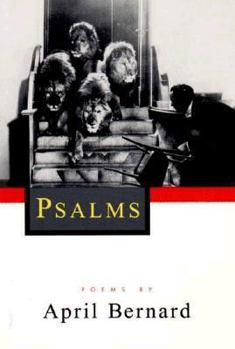Psalms: Poems
Select Format
Select Condition 
Book Overview
Carrying forward an age-old argument about the existence of God and the paradox of human suffering, they test the barriers to faith in ourselves and in our connections with others, and they explore... This description may be from another edition of this product.
Format:Paperback
Language:English
ISBN:0393313042
ISBN13:9780393313048
Release Date:May 1995
Publisher:W. W. Norton & Company
Length:74 Pages
Weight:0.25 lbs.
Dimensions:0.3" x 5.5" x 8.2"
Customer Reviews
3 ratings
refined language
Published by Thriftbooks.com User , 21 years ago
April Bernard's language is always new, & in this book especially it feels very crisp.
White, Yellow and Gray: Cloud, Moon and City Darkness
Published by Thriftbooks.com User , 23 years ago
"Psalms," the second collection of poetry by New York poet April Bernard, just doesn't sing the way many literary critics and poets seem to think a contemporary American poem should sing. Ever since the namby-pamby "conversational" movement hit the scene in the early 1980s, poets and critics alike generally have spurned experimentation--mainly in reaction to the hopelessly arcane and often occult ramblings and ruminations that made the late 1960s and early 1970s such a weird period, as dominated by dozens and dozens of Robert Lowell wannabes and John Ashberry clones. Ostensibly, the whole idea behind making poems that reflect the "conversational" style of American speech and discourse was to bring poetry down to where the proverbial goats can get it: close to the ground, not up in the trees. Hopefully--especially according to the practitioners who found they had less trouble than others slipping into the new ethic--the tactic of making poetry more accessible to a general readership would attract an actual audience to a flagging artform.Of course, that tactic, successful to a vast degree, had its down side: Although audiences for poetry were indeed growing, more and more poems were beginning to sound like Dear Abby advice columns that had been reassembled to look like poetry. Although the meaning of most poems had been rendered more transparent by turning a poem into a rarefied form of newspaper punditry, the capacity for a poem to convey meaning outside the paradigm of an assembly of words and prefabricated metaphorical opportunities had been either reduced or made even more difficult for those of us who do the actual assembly. With her first major collection, 1988's "Blackbird Bye Bye" April Bernard not only anticipated the backlash to "conversational" poetry that is currently gaining steam in America's literary underground, she transcended that backlash. Not content to rely on the epigramatic and the traditional form--as do many so-called "formalist" thinkers such as Dana Giola and Frederick Turner--Bernard parodied traditional forms, combining symbolist techniques with beat techniques, early free verse stylistics with blends of classical and postmodern, and even throwing in a bit of abstract expressionism-borne tactics such as combinations of disjunct and disconnected images into a whole that, if not greater than the sum of its parts, was at least qualitatively different than that sum. "Psalms" is an extension of Bernard's experimentation. Taking on only the barest semblence of the ancient psalmist forms of prayer and song, Bernard explores a variety of sensations and mental states often discarded by contemporaries who are stiving for what poet Robert Bly calls "heat"--that one kernel of meaning at the end of a poem that snaps all the pieces together in a sort of "aha!" In other words, Bernard's poems are not meant to connect in the same way. Bernard, rather, is concerned with connecting her readers with experience that can't be rat
Hard contemporary urban poetry in a traditional vein.
Published by Thriftbooks.com User , 24 years ago
I find this poetry fascinating. The form of the poetry evokes (and occasionally uses) the forms of the Biblical Psalms. The subject matter sometimes corresponds to the Biblical expectations as well. But within this framework, the poetry is firmly committed to a very urban, hard and somewhat dark view of contemporary life. The poet is very skilled - the craftsmanship is there but invisible - i.e. the content rather than craft comes through in reading these poems. This book is well worth reading - even if you find you don't like the poems, your appreciation for poetry should be expanded by seeing what April Bernard has achieved





